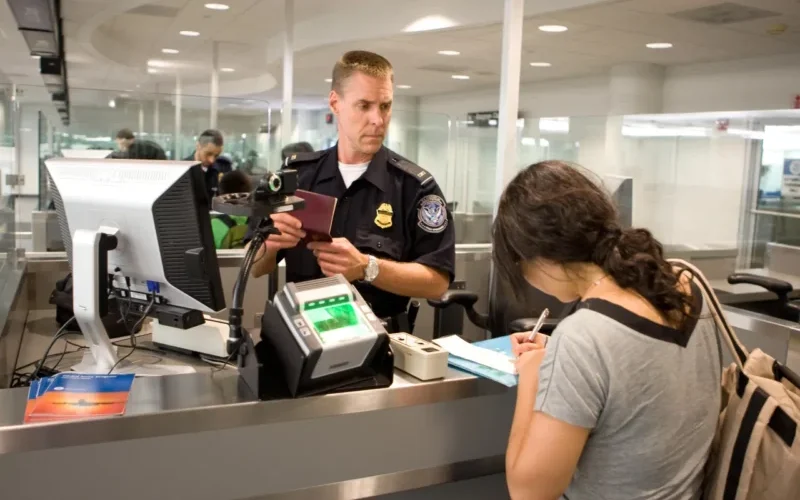Australian visitors to the US in June were down 11% on the previous year, following a similar collapse in visitors from other countries of nearly 12% in March. Andrew Gardiner reports.
When corporates and academics cut back in uncertain times, overseas travel is one of the first expenses they rein in. Business travel alone fell by nine percent globally in April as companies and workers grappled with economic uncertainty and anger over Trump’s tariffs, immigration and border policies.
Donald Trump has risked chasing away even more corporate and academic visitors by slapping on a US$250 (A$383) visa integrity fee. “(The fee does) nothing but discourage visitation at a time when foreign travellers are already concerned about the welcome experience and high prices”, an exasperated US Travel Association president, Geoff Freeman, said.
Academic visitors can also find themselves in strife over politics. Certain kinds of research are now in the Trump crosshairs, and like everyone, students or scholars are now subject to arbitrary searches of digital devices and the threat of deportation (even scrubbing their social media accounts may not save them).
Sydney-based American history academic Katharina Ruckstuhl travelled to the US at least twice a year until Trump returned to the White House. “I’m nervous – I worry about Diversity, Equity and Inclusion (DEI) and the very fact that a conference I’d planned to attend was about Indigenous issues,” Ruckstuhl, who cancelled her travel, said.
Observers say funding cuts to Australian and other foreign researchers whose work doesn’t promote arbitrary metrics of American “influence, trust, and reputation” have hindered the scope, diversity, and quality of higher knowledge. Meanwhile, promising and thriving academic careers have been left in limbo.
Draconian border enforcement
This off-the-cliff plunge in visitors to the US is hardly surprising, given the recent, North Korea-like shift in American border enforcement. Just last week, the US coast guard crossed a maritime border before kidnapping and briefly detaining a Quebec man fishing in Canadian waters, while nightmare tales from American airports and punitive retribution for anything critical of the new administration are now common knowledge.
Meanwhile, racial profiling may have claimed an Australian in Nicolle Saroukos, a young newlywed whose “crime”, she says, was visiting her American husband.
“I felt as though they ruled that maybe I was going to overstay my visa,” Saroukos, whose complexion is dark, said. “I was subjected to a cavity search and a strip search. I felt as though they were profiling me.”
Travelling elsewhere
Where are the tourists going instead? Standout destinations in May included Indonesia (Bali) up 16%, Japan up 32%, Vietnam up 26% and China up 27%.
“Asia continues as the preferred playground for Australian travellers, with Bali, Tokyo and Ho Chi Minh City topping itineraries for millions,” the Australian Travel Industry Association’s Nina Hedges said.
South America has also picked up the slack, with trips to Peru up 59% and flights to Ecuador up 48%. Intrepid Travel’s Brett Mitchell told MWM,
People aren’t cancelling their holidays, they’re still travelling, just looking at different options.
Did early-June unrest in Los Angeles contribute to the sharp drop in Australian visitors that month? Probably not, travel industry sources say.
“There was no full-on panic, but there’s definitely more concern about the overall vibe in bigger American cities right now,” travel advisor Asia Lantz said. “There (was) no softening (of numbers) to speak of.”
Nonetheless, Flight Centre’s Graham Turner says things look shaky longer-term. “People from Europe, the United Kingdom and Australia really don’t want to go to the States, given what’s happening there.
We’re hearing more and more people don’t want to go through (US) passport control.
What’s next?
According to one forecast, the US could lose up to US$10 billion in international travel spending in 2025 alone if the current policies continue. Oxford Economics estimates that America won’t see a full recovery of international arrivals until after Trump leaves office in 2029.
“Policies and pronouncements from the Trump administration have contributed to a growing wave of negative sentiment toward the US among potential international travellers,” the Oxford Economics research briefing read. “Combined with a strong US dollar, it’s creating additional barriers for those considering travel to the US.”
It seems Australians, and others, were blindsided by the return to power of a US president seemingly determined to defy norms around commerce, higher learning, freedom of speech and the treatment of minorities. The ramifications go well beyond a bit of inconvenience (or worse) at the airport.
Economists say Trump’s brinkmanship has generated huge uncertainty for consumers and businesses alike. As a result,
J P Morgan sees a 40% likelihood of recession there this year.
Returns on intellectual investments, via study and research at Ivy League institutions like Harvard or Cornell, are looking just as shaky. Trump’s targets have been colleges, law firms and his long-time nemesis, the free press, all seen as guardrails protecting democracy.
“If Trump can control the media (and bully the Professors) he will be free to enact whichever policies he wants — without anyone to hold him accountable for the harm they may do”, wrote the Huffington Post’s Nathalie Baptiste.
It’s not like Trump ever pretended he was someone else. So here we are, watching a slow-motion car crash (with global ramifications) from a distance of 12,000 km.
Canada, New Zealand and a bunch of European countries have issued clear warnings against attending that car crash in person. Australians contemplating trans-Pacific travel might want to read them.
Tariffs, shares, bonds and China’s ‘nuclear option’. Making sense of Trump mayhem
An Adelaide-based graduate in Media Studies, with a Masters in Social Policy, I was an editor who covered current affairs, local government and sports for various publications before deciding on a change-of-vocation in 2002.

